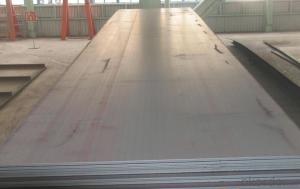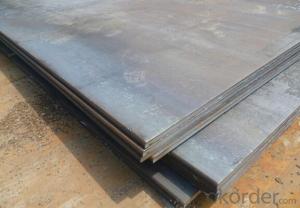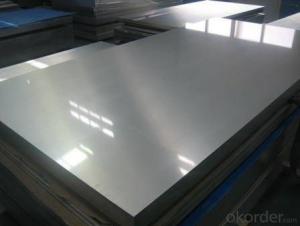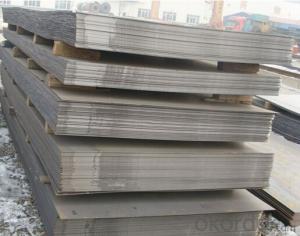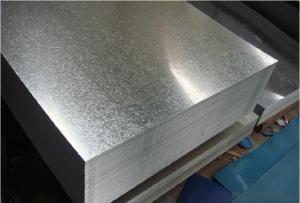Hot Rolled Steel Sheet_Plate Weight with High Quality
- Loading Port:
- Tianjin
- Payment Terms:
- TT OR LC
- Min Order Qty:
- 3 m.t.
- Supply Capability:
- 10000 m.t./month
OKorder Service Pledge
OKorder Financial Service
You Might Also Like
Item specifice
Hot Rolled Steel Sheet_Plate Weight with High Quality
Thickness:0.6-200mm
Width:1000-4000mm
MOQ: 1 ton
Certificate:ISO,SGS
Hot Rolled Steel Sheet_Plate Weight with High Quality
Commodity | Carbon Steel Hot Rolled Coil_Plate_Strip_Sheet |
Thickness | 0.6-200mm |
Width | 1000-4000mm |
Length | as custom's request |
Technique | Cold rolled or hot rolled mild steel plate |
Surface treatment | Bare, galvanized coated or as customer's requirements. |
Standard | ASTM,EN,GB,JIS |
Material | SS330, SS400, SPHC, SPHD, SPHE, Q195, Q195L, Q235, Q345, 08AL |
Usage | 1. Automobile, Bridges, Buildings,
2. Machinery, Pressure vessel industries.
3. Ship building, Engineering construction,
4. Mechanical manufacturing, Pavement slab, ect.
|
Terms of Payment | 30% T/T as deposit and 70% T/T balance againest B/L copy. |
Delivery Detail | Within 3-15 days after receipt of deposited for the mild steel plate |
CNBM Introduction of Hot Rolled Steel Sheet_Plate Weight with High Quality
CNBM International Corporation is the most import and export platform of CNBM group(China National Building Material Group Corporation) ,which is a state-owned enterprise, ranked in 270th of Fortune Global 500 in 2015.
With its advantages, CNBM International are mainly concentrate on Cement, Glass, Iron and Steel, Ceramics industries and devotes herself for supplying high quality series of refractories as well as technical consultancies and logistics solution.
After-sale service |
|
Advantages
|
|
Packaging & Delivery of Hot Rolled Steel Sheet_Plate Weight with High Quality
Packaging Detail | Sea worthy packing /as per customer's packing instruction |
Delivery Detail | 15 ~ 40 days after receiving the deposit |
Products
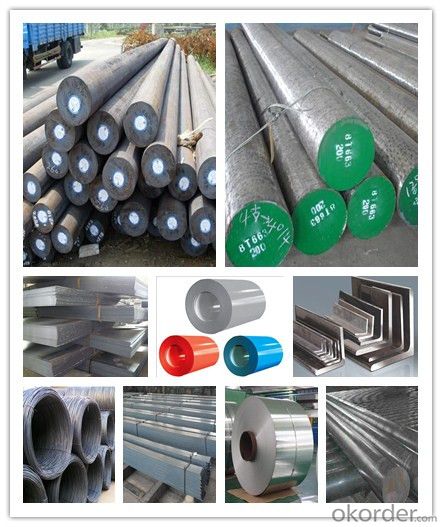
FAQ:
Are you a trading company or manufacturer? | Manufacturer |
What’s the MOQ? | 3 metric ton |
What’s your delivery time? | 15-35 days after downpayment received |
Do you Accept OEM service? | Yes |
what’s your delivery terms? | FOB/CFR/CIF |
What's the Payment Terms? | 30% as deposit,70% before shipment by T/T |
Western Union acceptable for small amount. | |
L/C acceptable for large amount. | |
Scrow ,Paybal,Alipay are also ok | |
Why choose us? | Chose happens because of quality, then price, We can give you both. Additionally, we can also offer professional products inquiry, products knowledge train (for agents), smooth goods delivery, excellent customer solution proposals. |
What's your available port of Shipment? | Main Port, China |
What’s your featured services? | Our service formula: good quality+ good price+ good service=customer's trust
|
Where are your Market? | Covering more than 160 countries in the world |
- Q:What are the requirements for special steel used in telecommunications equipment manufacturing?
- The requirements for special steel used in telecommunications equipment manufacturing typically include high strength, excellent corrosion resistance, good electrical conductivity, and the ability to withstand extreme temperatures. Additionally, the steel should possess good formability and weldability to facilitate the manufacturing process.
- Q:What are the advantages of using special steel?
- There are several advantages of using special steel. Firstly, special steel offers enhanced strength and durability compared to regular steel, making it suitable for applications that require high resistance to wear, fatigue, and impact. Secondly, special steel has excellent heat resistance, allowing it to maintain its structural integrity even at high temperatures. Additionally, special steel can be tailored to meet specific requirements, such as corrosion resistance, electrical conductivity, or magnetic properties. This versatility makes it suitable for a wide range of industries, including automotive, aerospace, construction, and energy. Overall, the advantages of using special steel include superior strength, durability, heat resistance, and customization possibilities.
- Q:What are the requirements for special steel used in cryogenic applications?
- Special steel used in cryogenic applications must meet several requirements to ensure its performance and reliability in extreme low-temperature environments. Firstly, the steel should have excellent low-temperature toughness to withstand the extreme cold. This means that it should be able to resist brittle fracture and maintain its mechanical properties even at cryogenic temperatures. The steel should have a high toughness and ductility to absorb impact and prevent cracking. Secondly, the steel must have a low coefficient of thermal expansion. This is important because cryogenic applications involve significant temperature changes, and a high coefficient of thermal expansion can lead to dimensional instability and stress within the material. A low coefficient of thermal expansion helps to minimize these effects and maintain dimensional stability. Thirdly, the steel should have a low thermal conductivity. Cryogenic applications often involve the transfer or storage of extremely cold substances, and a low thermal conductivity helps to prevent heat transfer and maintain the desired temperature. This is particularly important for applications where temperature control is critical, such as in the storage of liquefied gases. Additionally, the steel should have good corrosion resistance. Cryogenic environments can be highly corrosive, and the steel needs to be able to withstand the effects of any corrosive substances that may be present. This is particularly important for applications involving the storage or transportation of cryogenic liquids or gases. Finally, the steel should have good weldability. In many cryogenic applications, welding is required to join different components or sections of the steel. Therefore, the steel must have good weldability to ensure strong and reliable joints. In summary, the requirements for special steel used in cryogenic applications include excellent low-temperature toughness, low coefficient of thermal expansion, low thermal conductivity, good corrosion resistance, and good weldability. Meeting these requirements ensures that the steel can withstand the extreme cold and harsh conditions of cryogenic environments while maintaining its structural integrity and performance.
- Q:How is special steel used in the medical industry?
- Special steel is used in the medical industry for various applications, including the manufacturing of surgical instruments, implants, and medical devices. It possesses unique properties such as high strength, corrosion resistance, and biocompatibility, making it ideal for these applications. Additionally, special steel is used in the production of high-quality tools and equipment used in medical research and laboratory settings.
- Q:Can special steel be used in the manufacturing of consumer goods?
- Indeed, the utilization of special steel in the production of consumer goods is possible. Special steel refers to a specific type of steel that has been engineered to possess exceptional properties, such as increased strength, corrosion resistance, heat resistance, or wear resistance. These enhanced characteristics render it suitable for a broad range of applications, including the manufacturing of consumer goods. Consumer goods encompass a diverse array of products, ranging from kitchen appliances and electronics to automobiles, tools, and furniture. Special steel can be employed in various components and parts of these goods to enhance their performance and durability. For instance, in kitchen appliances, special steel can be utilized to fabricate blades, heating elements, or cooking surfaces, thereby improving cutting efficiency, heat distribution, and resistance to corrosion. In electronics, special steel can be employed in the production of casings, connectors, or springs to ensure durability, conductivity, and resistance to temperature fluctuations. Furthermore, special steel can also find application in the manufacturing of consumer goods that demand high precision and reliability. In the automotive industry, for example, special steel can be used for engine components, chassis, or safety features, providing superior strength, impact resistance, and structural integrity. Likewise, in the production of tools and equipment, special steel can be employed to manufacture drill bits, cutting tools, or machine components, guaranteeing longevity, precision, and optimal performance. In conclusion, special steel offers distinct advantages over conventional steel due to its unique properties, making it an ideal material choice for the production of consumer goods. Its enhanced strength, corrosion resistance, heat resistance, or wear resistance characteristics can significantly enhance the performance, durability, and reliability of consumer products, thereby meeting the demands and expectations of consumers.
- Q:What are the different forming techniques used for special steel?
- Some of the different forming techniques used for special steel include rolling, forging, extrusion, and casting.
- Q:What are the main characteristics of pressure vessel steel?
- Pressure vessel steel is a specific type of steel that is designed and manufactured to withstand high-pressure environments. It possesses several distinct characteristics that make it suitable for such applications. Firstly, pressure vessel steel has excellent strength and toughness properties. It is able to withstand the internal pressure exerted on it without deforming or rupturing, ensuring the safety and integrity of the vessel. This high strength is achieved through careful alloying and heat treatment processes that enhance its mechanical properties. Secondly, pressure vessel steel exhibits good weldability. This is crucial as pressure vessels often require various components to be joined together. The ability to weld the steel without compromising its structural integrity is essential for the fabrication and maintenance of pressure vessels. Additionally, pressure vessel steel is known for its high corrosion resistance. The steel is typically alloyed with elements such as chromium, molybdenum, and nickel, which provide a protective barrier against corrosive substances and environments. This is vital in preventing the degradation of the vessel and ensuring its long-term durability. Furthermore, pressure vessel steel is characterized by its ability to withstand a wide range of temperatures. It can maintain its strength and toughness even in extreme temperature conditions, making it suitable for applications where the vessel is subjected to high or low temperatures. Lastly, pressure vessel steel is subjected to rigorous testing and quality control measures to ensure its reliability and safety. It must meet specific standards and certifications, such as those established by organizations like the American Society of Mechanical Engineers (ASME), to be deemed suitable for pressure vessel applications. Overall, the main characteristics of pressure vessel steel include high strength and toughness, good weldability, corrosion resistance, temperature resistance, and adherence to strict quality standards. These properties make it an ideal material for the construction of pressure vessels, which are used in various industries such as oil and gas, chemical processing, and power generation.
- Q:What are the properties of nitriding steel?
- Nitriding steel is a type of steel that undergoes a surface treatment process called nitriding. The main properties of nitriding steel include increased hardness, improved wear resistance, enhanced fatigue strength, and increased corrosion resistance. This is achieved by introducing nitrogen into the surface layer of the steel, forming a hard compound called nitrides. Nitriding steel also exhibits a low coefficient of friction, making it suitable for applications where sliding or rubbing contact occurs. Additionally, nitriding steel retains its core toughness and ductility, making it an ideal choice for components subjected to high-stress conditions.
- Q:How does special steel contribute to the defense and security industry?
- Special steel contributes to the defense and security industry by offering exceptional strength, durability, and resistance to extreme conditions. It is used in the production of various critical components such as armored vehicles, aircraft carriers, submarines, and ballistic protection systems. Special steel's unique properties enhance the performance and reliability of these defense systems, ensuring their effectiveness in safeguarding national security.
- Q:What are the main applications of special steel in the electronics packaging?
- The main applications of special steel in electronics packaging include providing structural support and protection for electronic components, ensuring electromagnetic compatibility, heat dissipation, and preventing corrosion.
1. Manufacturer Overview |
|
|---|---|
| Location | |
| Year Established | |
| Annual Output Value | |
| Main Markets | |
| Company Certifications | |
2. Manufacturer Certificates |
|
|---|---|
| a) Certification Name | |
| Range | |
| Reference | |
| Validity Period | |
3. Manufacturer Capability |
|
|---|---|
| a)Trade Capacity | |
| Nearest Port | |
| Export Percentage | |
| No.of Employees in Trade Department | |
| Language Spoken: | |
| b)Factory Information | |
| Factory Size: | |
| No. of Production Lines | |
| Contract Manufacturing | |
| Product Price Range | |
Send your message to us
Hot Rolled Steel Sheet_Plate Weight with High Quality
- Loading Port:
- Tianjin
- Payment Terms:
- TT OR LC
- Min Order Qty:
- 3 m.t.
- Supply Capability:
- 10000 m.t./month
OKorder Service Pledge
OKorder Financial Service
Similar products
New products
Hot products
Related keywords
